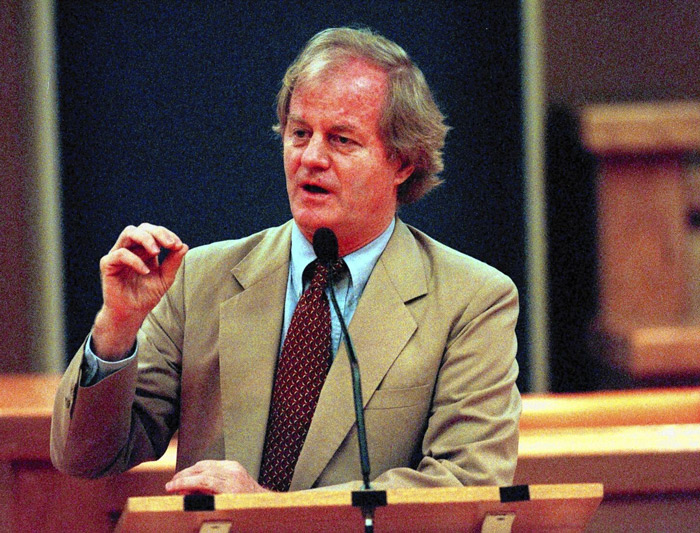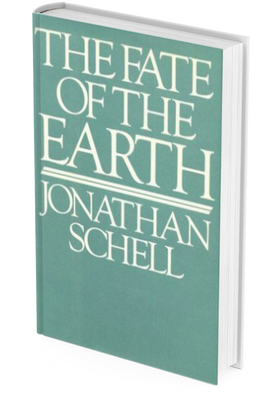The Fate of the Earth and Jonathan Schell as A Historian of the Future
December 27, 2022

December 27, 2022

To close the year 2022, it seems particularly appropriate to pay homage, on the 40th anniversary of its publication, to a passionate and penetrating work by Jonathan Schell, entitled The Fate of the Earth. The book, based on a series of articles he wrote in The New Yorker, was subsequently published in 1982, and played a critical role in raising public awareness about the dangers of the nuclear arms race.
The work, characterized by elegant writing and powerful argumentation, is a clinical analysis of the after-effects of a limited nuclear war between the two major powers, described by an incisive mind and an exceptionally articulate pen. In the words of only one of many reviewers, Kai Erickson of The New York Times Book Review, “This is a work of enormous force. There are moments when it seems to hurtle almost out of control, across an extraordinary range of fact and thought. But in the end, it accomplishes what no other work has managed to do in the years of the nuclear age. It compels us–and compel is the right word–to confront head on the nuclear peril.”
In the opening section of the book, Schell writes, “Usually, people wait for things to occur before trying to describe them, but since we cannot afford under any circumstances to let a holocaust occur, we are forced in this one case to become the historians of the future — to chronicle and commit to memory an event that we have never experienced and must never experience.”
Jonathan made a deep impression on us during several visits, beginning in 1986, and later in 1993 (and in 1996), when he stayed in our home in Moscow. We had invited him to expand on the themes he had first touched on in The Fate of the Earth, this time to a select group of prominent Russian thinkers and experts, including several who had been closely associated with and supportive of Mikhail Gorbachev’s policy of glasnost or “openness”. All were deeply moved by his luminous mind, and his wholly unpretentious character, seemingly impervious to the dangers of self.
The issue which seemed to occupy Schell’s mind most during his Moscow meetings was what had led to the demise of the Soviet Union. The assembled Russian guests showed him great warmth and deep respect and in the course of the evening, two of the most eminent among them shared some particularly poignant memories with us. One was a leading Dostoevsky scholar and former member of the Supreme Soviet, the highest legislative authority during the time of the Soviet Union; the other was a senior member of the Russian parliament, a former ambassador and significant figure in Russia’s foreign policy establishment. What they shared with us was not only revealing in and of itself, but highlighted the critical importance of Schell’s book.
They told the assembled guests that when The Fate of the Earth had been published in the West in 1982, the Central Committee of the Communist Party of the Soviet Union had ordered the book to be translated. One hundred, carefully numbered, top-secret copies were then printed and circulated, on a strictly need-to-know basis, among leading members of the Soviet political and military establishment. These two gentlemen managed to get hold of a copy from a friend who had temporary access to it and locked themselves up for a weekend in a dacha outside Moscow to read it from cover to cover. It was an experience they described as mind-expanding and soul-stirring. They then told us that in the years immediately following, as these one hundred copies made the rounds among the top echelons of the Soviet power structure, they significantly transformed the mindset of many top policymakers. As a result of reading Schell’s work, many began to recognize the futility of the arms race and the extent to which a Soviet economy, based on an oversized military industrial complex was unsustainable, and that, at best, the arms race was a recipe for continued economic misery; at worst, it would lead to the nuclear annihilation of mankind.

In addition to the obvious moral issues raised by the use of nuclear weapons, Schell was acutely conscious of the need for new governance mechanisms to forestall and prevent a nuclear cataclysm. He contended that lasting international peace would be feasible only in the context of the creation of effective global institutions based on the principles of collective security. As he wrote in The Fate of the Earth:
I would suggest that the ultimate requirements are in essence…global disarmament, both nuclear and conventional, and the invention of political means by which the world can peacefully settle the disputes that throughout history it has settled by war.
Margalit Fox in her obituary for Schell written for the New York Times on 26 March 2014, spoke for many of us when she said:
With The Fate of the Earth Mr. Schell was widely credited with helping rally ordinary citizens around the world to the cause of nuclear disarmament. The book, based on his extensive interviews with members of the scientific community, outlines the likely aftermath of a nuclear war and deconstructs the United States’ long-held rationale for nuclear buildup as a deterrent.
Jonathan Schell exemplified the very best of America and deserved greater world-wide recognition than he was given. He was worthy of the Nobel Peace Prize.
The Fate of the Earth has aged extremely well. It remains a vital source for those keen to understand the multiple physical, humanitarian, and global ramifications of the use of nuclear weapons, even on a limited scale. It is still a brilliant deconstruction of the fallacies of nuclear deterrence, the belief that since nuclear weapons make nuclear war prohibitively destructive this provides adequate justification for their existence, a line of argument that obviously disregards the fact that in the absence of nuclear weapons, we would not be faced with their threat to begin with. Jonathan Schell did not live long enough to help us reinvent those means by which we rethink our global governance architecture, to permanently set aside warfare as a means of achieving political ends. He did warn us, in The Unconquerable World, about the rapidly diminishing utility of weapons and military force to achieve such ends, as the experience of Iraq, Afghanistan and more recently Ukraine has eloquently shown.
He is also missed for yet another reason: the incomparable moral force of his arguments. In an age in which public discourse is often debased, in which politicians more often than not are more motivated by the exercise of power rather than the benefits that such power is supposed to deliver to the peoples over whom they rule, when their inaction and, in far too many cases, their corruption puts mankind’s future at risk, we need voices who speak truth to power without fear, with a firm conviction that there is surely a better way to run the world.
Written by Augusto Lopez-Claros
2020 Global Governance Forum Inc. All Rights Reserved